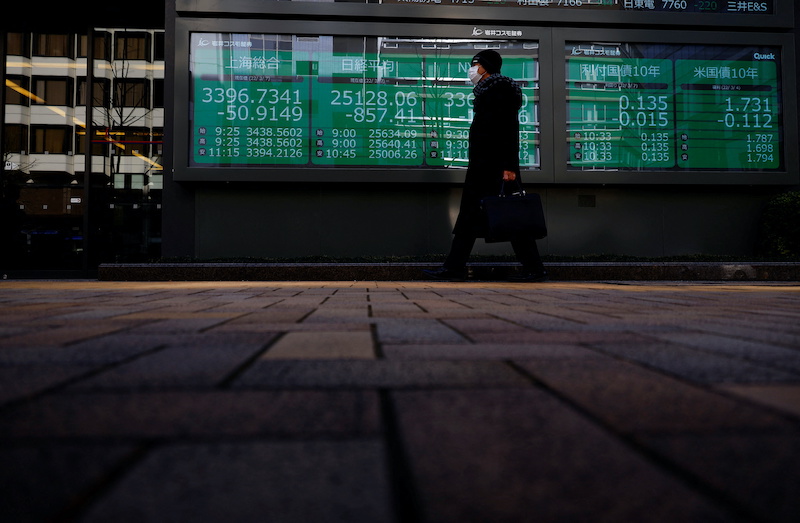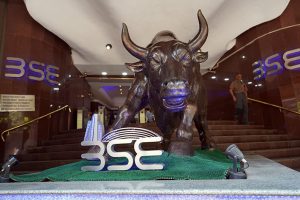Asia’s markets made a gloomy start to the week with investor nerves still rattled by the threat of a banking crisis despite a rescue deal for Swiss lender Credit Suisse.
Japan’s Nikkei share average dropped, tracking Wall Street’s slump, as worries about recession and the global banking sector hurt demand for risk assets.
The Nikkei share average dropped 1.42%, or 388.12 points, to close at 26,945.67, while the broader Topix was down 1.54%, or 30.12 points, to 1,929.30.
Also on AF: Huawei Replaces 13,000 US-Banned Parts as it Plots Fightback
“I had thought the news about a rescue for Credit Suisse would be positive for the market, but it fell deeper than I expected,” said Shigetoshi Kamada, general manager at the research department at Tachibana Securities.
In a crisis that began with the collapse of US-based Silicon Valley Bank last Friday, investors lost confidence in US regional banks and Credit Suisse in Europe.
Wall Street closed lower on Friday, with its three main indexes ending the session deep in negative territory, with financial stocks down the most among the major sectors of the S&P 500.
Over the weekend, UBS Group AG said it will buy Credit Suisse for $3.2 billion and assume up to $5.4 billion in losses, in a shotgun merger engineered by Swiss authorities.
In Japan, the banking sector index on the Tokyo Stock Exchange lost 0.92% after jumping more than 1% earlier in the session.
Hong Kong shares fell too, as fears over the banking sector’s troubles weighed on sentiment in Asia’s financial hub.
HSBC Stock Suffers
China stocks, meanwhile, edged down despite Beijing’s fresh monetary-easing measures to support economic growth with traders unsettled by Europe’s banking woes.
Investors will also be closely watching Chinese President Xi Jinping’s visit to Russia, as Beijing touts a plan to end the grinding Ukraine war that has received a lukewarm welcome on both sides.
Qi Wang, CEO of MegaTrust Investment (HK), said if Xi could engineer a possible end to the Russia-Ukraine war, the No1 overhang on Hong Kong stocks right now – the geopolitical tension between China and the West – could be removed.
In Hong Kong, HSBC stock dropped 7% in its worst session for six months and the Hang Seng Index slumped 2.65%, or 517.88 points, to 19,000.71, while the Hang Seng China Enterprises Index lost 2.2%.
The Shanghai Composite Index fell 0.48%, or 15.64 points, to 3,234.91, while the Shenzhen Composite Index on China’s second exchange slipped 0.32%, or 6.54 points, to 2,053.65.
Elsewhere across the region, Sydney, Seoul, Singapore, Taipei, Wellington, Manila, Mumbai and Jakarta were all in the red.
Fed Funds Futures Surge
Globally, banks led stock markets lower and safe havens such as bonds rallied as the weekend deal to rescue Credit Suisse and promises of liquidity from central banks failed to stem fears that a bigger crisis is brewing in the financial system.
Asia gains for S&P 500 futures and European futures reversed as the sun rose in London. S&P 500 futures were last down 1%. European futures dropped 1.2% and FTSE futures fell 1.5%, and investors rushed to price in interest rate cuts.
“This time last week, when we were talking about SVB and Signature, it was very different in that we were talking about just the depositors and not the quality of the assets,” said Steven Major, global head of fixed income research at HSBC.
“This week we’ve moved over to Europe and we’re looking at assets … anyone who said last week you can’t compare sub-prime mortgages and sub-prime bonds with this crisis – well, actually it’s moved on,” Major added.
Bonds whipsawed with the mood. Selling in Asia gave way to a rush to safety, driving the yield on two-year and 10-year Treasuries to the lowest levels in six months. An early move out of safe-haven currencies fizzled and the yen rose 0.5%.
Fed funds futures surged as investors dialled down future rate cuts and began pricing in US cuts as soon as June.
“It’s pretty wild and there’s a lot of volatility probably still to come,” said Jason Wong, strategist at BNZ.
Key figures
Tokyo – Nikkei 225 < DOWN 1.42% at 26,945.67 (close)
Hong Kong – Hang Seng Index < DOWN 2.65% at 19,000.71 (close)
Shanghai – Composite < DOWN 0.48% at 3,234.91 (close)
London – FTSE 100 < DOWN 0.22% at 7,319.32 (0945 GMT)
New York – Dow < DOWN 1.19% at 31,861.98 (Friday close)
- Reuters with additional editing by Sean O’Meara
Read more:
Rapid Rate Hikes Played Role in SVB Collapse: PBOC Official
Beijing Ready to Let Foreign Financial Firms List in China























